Ever wonder what happens when your biggest competitor suddenly gets a billion-dollar advantage? That’s exactly where Africa stands as China pours unprecedented resources into artificial intelligence research while most African nations are still debating basic AI policies.
OpenAI’s recent warning about China’s aggressive AI push isn’t just Silicon Valley drama. It’s a five-alarm wake-up call for Africa’s technology future that demands immediate attention from policymakers, businesses, and tech communities across the continent.
Africa cannot afford to be merely consumers in the next phase of AI development. The continent’s unique challenges require African AI solutions developed with African data and priorities.
But here’s the uncomfortable question nobody’s asking: If Africa misses this AI revolution, will the continent ever catch up, or are we looking at a new form of digital colonization that makes previous tech gaps look tiny in comparison?
The AI Race Between US and China: Understanding the Competitive Landscape
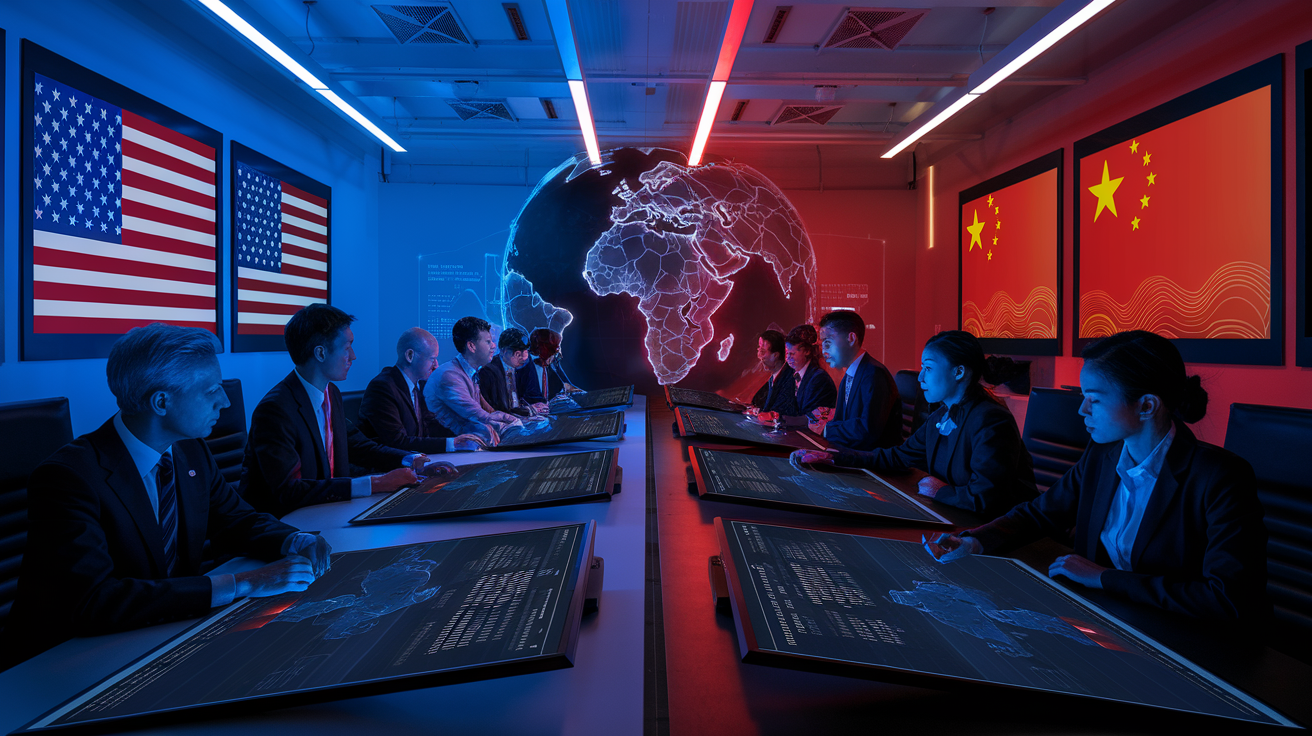
A. OpenAI’s Recent Warnings: Unpacking the Key Concerns
The alarm bells are ringing, and OpenAI isn’t holding back. Last month, Sam Altman shocked tech circles when he warned that China’s AI acceleration poses a “significant threat” to Western technological supremacy. This wasn’t just casual tech talk – it was a calculated warning from one of AI’s most influential voices.
What’s got OpenAI so worried? For starters, the sheer scale of China’s compute power. They’re building AI clusters that dwarf anything seen in Silicon Valley, with the latest Tianhe-3 supercomputer boasting capabilities that make yesterday’s cutting-edge look like a pocket calculator.
But raw computing isn’t the whole story. OpenAI highlighted three specific concerns:
- Data sovereignty – China’s access to vast, unrestricted datasets gives their models training advantages Western companies can’t match
- Regulatory freedom – While Western AI faces increasing oversight, Chinese firms operate with fewer constraints
- Military integration – The direct pipeline between civilian AI research and military applications
“We’re not just talking about beating us to market with the next chatbot,” warned Altman during his Congressional testimony. “We’re talking about fundamental reshaping of information infrastructure worldwide.”
B. China’s Strategic AI Investments and Technological Advancements
China isn’t just competing – they’re executing a masterplan decades in the making. Since announcing their “New Generation AI Development Plan” in 2017, they’ve poured over $150 billion into becoming the global AI leader by 2030.
The results speak for themselves. Chinese AI papers now outnumber American publications by nearly 2:1. Their facial recognition systems process billions of images daily across their sprawling urban surveillance networks. And their quantum computing initiatives have already achieved “quantum supremacy” in specific computational challenges.
What’s particularly striking is how China has pivoted from copying to innovating. Take Baidu’s ERNIE Bot – initially dismissed as a GPT clone, it now outperforms Western models on Chinese language tasks and contextual understanding of cultural nuances.
The investment isn’t slowing down either. The latest Five-Year Plan earmarks an additional $70 billion specifically for next-generation AI research, focusing on three areas:
- Multimodal large-scale models that integrate text, vision, and physical world understanding
- AI chips designed specifically for machine learning at unprecedented scales
- Brain-computer interfaces that push beyond current limitations
C. The Geopolitical Implications of AI Dominance
This isn’t just a tech race – it’s the new space race, with stakes possibly even higher. AI dominance translates directly to economic, military, and cultural power in ways we’re only beginning to understand.
Countries that lead in AI development will set the rules for how these technologies develop globally. They’ll control the underlying infrastructure, determine ethical frameworks, and potentially lock other nations into technological dependency.
What’s particularly concerning is how AI amplifies existing power dynamics. Nations with advanced AI capabilities can:
- Deploy sophisticated influence operations that reshape public opinion
- Develop autonomous weapons systems that fundamentally change warfare
- Create economic chokepoints through control of key algorithms and data flows
The diplomatic ripples are already visible. Last year’s “Beijing AI Alliance” brought together 17 nations committing to China’s vision of AI governance – a direct challenge to Western attempts to establish global standards.
Most significantly, AI is becoming a dividing line in international relations. Countries increasingly face pressure to align with either the Chinese or American AI ecosystem, creating new fault lines in global politics.
D. How the AI Race Impacts Global Power Dynamics
The tremors from this AI race shake every corner of the international system. Traditional metrics of national power – military size, GDP, population – are being reconsidered as AI capabilities become the new currency of global influence.
Small, AI-savvy nations like Israel and Singapore now wield outsized influence in international affairs. Meanwhile, resource-rich countries without strong AI development risk becoming “data colonies” – providing raw materials for AI systems while remaining dependent on foreign technology.
Military planners worldwide are scrambling to adapt. The Pentagon’s latest AI strategy explicitly acknowledges they’re playing catch-up in certain domains, while China integrates AI across their entire military structure.
Perhaps most profound is how AI reshapes the very concept of sovereignty. When algorithms developed in one country make crucial decisions affecting citizens in another, traditional borders become increasingly meaningless.
This creates cascading effects across international institutions. The UN Security Council, WTO, and other pillars of the post-WWII order weren’t designed for a world where algorithms, not armies, determine national security and economic prosperity.
For countries caught in the middle, the choice isn’t simple. Aligning with either AI superpower brings benefits but also risks. The coming decade will reveal whether this technological cold war leads to a new bipolar world or something altogether different.
Africa’s Current Position in the Global AI Ecosystem
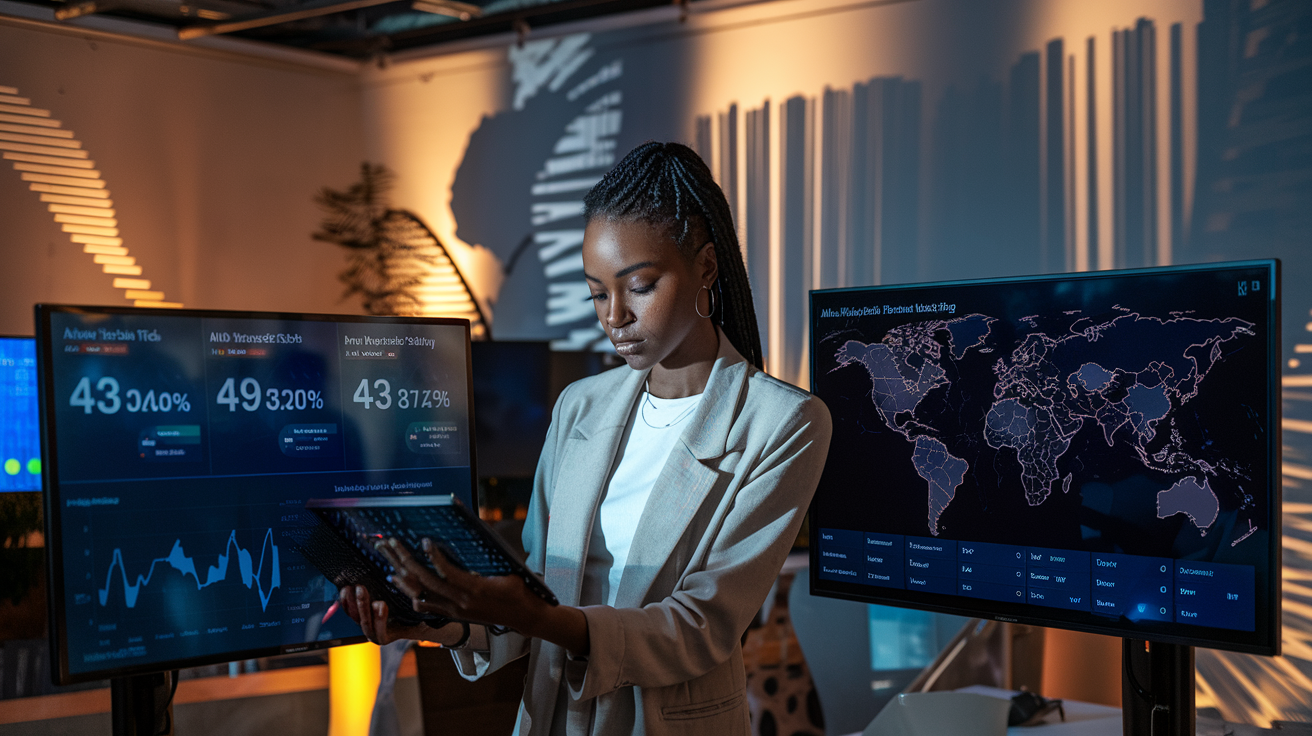
A. The State of AI Development and Adoption Across African Nations
The reality of AI in Africa isn’t what most global headlines would have you believe. While countries like Kenya, Nigeria, South Africa, and Egypt are making notable strides, the continent as a whole sits largely on the periphery of global AI development.
What’s actually happening on the ground? South Africa leads with the most advanced AI ecosystem, hosting research labs from companies like Amazon and Google. Kenya’s vibrant tech scene in Nairobi has birthed AI applications addressing local challenges in agriculture and healthcare. Nigeria’s massive talent pool is producing AI startups at an impressive clip, though most struggle to secure funding beyond seed rounds.
But step outside these tech hubs and the picture changes dramatically. In most African countries, AI adoption remains embryonic. Government AI strategies? Only about 7 African nations have published them. Research output? African academics contribute less than 2% of global AI research papers.
The private sector shows a similar divide. While multinational corporations have established scattered innovation centers, homegrown AI ventures face steep challenges in scaling beyond proof-of-concept. Most AI implementation happens through imported solutions rather than locally developed technologies.
B. Key Barriers Limiting Africa’s AI Progress
The roadblocks to Africa’s AI advancement aren’t mysteries. They’re painfully obvious to anyone working in the tech space across the continent.
Digital infrastructure gaps hit hard. How do you build AI when reliable electricity remains a luxury in many regions? When broadband penetration hovers below 40% across most of the continent? The foundation simply isn’t there yet.
Then there’s the talent pipeline problem. Africa produces around 50,000 computer science graduates annually—sounds impressive until you realize China graduates 185,000 AI specialists alone. The brain drain compounds this: roughly 38% of Africa’s top tech talent leaves for opportunities abroad.
Funding? It’s a massive obstacle. African AI startups captured just 0.5% of global AI venture funding in 2024. Most investments flow to consumer applications rather than fundamental research or infrastructure.
Data availability presents another critical challenge. AI thrives on data, but Africa lacks comprehensive, locally relevant datasets. Much of the continent’s data remains uncollected, undigitized, or owned by entities outside Africa.
Regulatory frameworks are either non-existent or developing in silos, creating a fragmented landscape that makes scaling AI solutions across borders nearly impossible.
C. Existing AI Initiatives and Success Stories in Africa
Despite these challenges, pockets of innovation are thriving across Africa. They deserve more spotlight than they get.
Zindi, Africa’s largest data science competition platform, has built a community of over 50,000 data scientists solving African problems. Their impact is real—developing models to detect crop diseases for smallholder farmers and optimizing public transport in congested cities.
Rwanda’s drone delivery network by Zipline showcases AI’s life-saving potential, delivering blood and medical supplies to remote health facilities in minutes rather than hours.
South Africa’s Aerobotics uses AI and drone imagery to help farmers identify pest and disease issues early, boosting yields by up to 20% in some cases.
Ethiopia’s iCog Labs collaborated on developing Sophia, one of the world’s most advanced humanoid robots, demonstrating that cutting-edge AI work can happen anywhere.
The Deep Learning Indaba, started in South Africa, has expanded to 27 African countries, building AI research capacity through workshops and mentorship programs.
Google’s AI research center in Ghana is tackling uniquely African challenges, from creating machine learning models that work across Africa’s 2,000+ languages to developing health diagnostic tools for low-resource settings.
D. The Innovation Gap: Why Africa Risks Being Left Behind
The innovation gap isn’t just about who gets cool tech first—it’s about who shapes the future. And right now, Africa isn’t in the room where decisions happen.
With China and the US racing ahead, Africa faces a widening digital colonialism threat. When AI systems used in Africa are trained primarily on Western or Asian datasets, they inherently embed those cultural biases and worldviews. Facial recognition systems perform poorly on darker skin tones. Language models struggle with African names and contexts.
The economic implications are sobering. McKinsey estimates AI could add $13 trillion to the global economy by 2030—with Africa positioned to capture less than 3% of this value based on current trajectories.
The employment landscape will transform dramatically. Countries with robust AI ecosystems will create new high-value jobs while those without will likely see traditional employment opportunities diminish without replacement.
Most concerning is the sovereignty question. Nations that depend entirely on imported AI risk having critical decisions—from resource allocation to security systems—influenced by foreign algorithms designed for different contexts and priorities.
The innovation gap also reinforces existing inequalities. Urban centers pull further ahead of rural areas. The digitally connected benefit while the unconnected fall further behind. The tech-educated thrive while others struggle to remain relevant in an AI-transformed economy.
Why China’s AI Push Matters Specifically for Africa
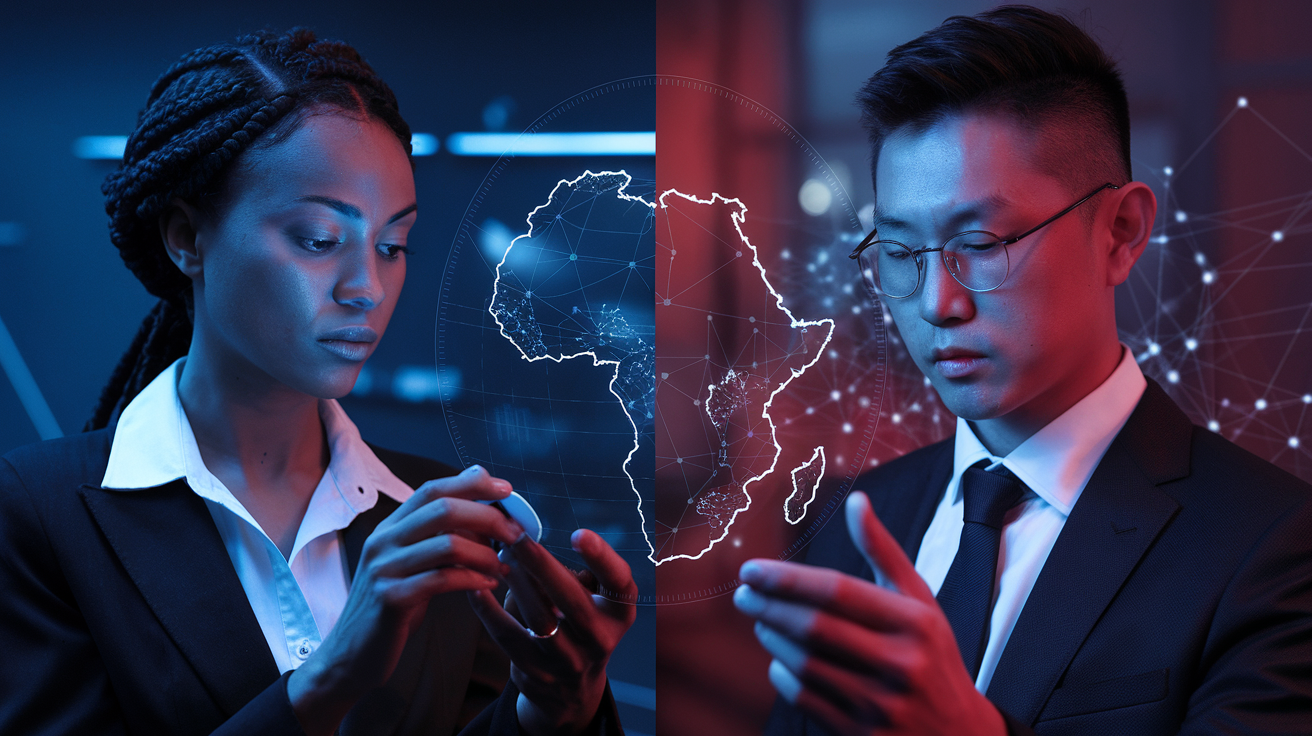
Why China’s AI Push Matters Specifically for Africa
A. China-Africa Economic Relations: The Digital Silk Road
China’s not just building roads and railways across Africa anymore—they’re laying down digital highways too. The Digital Silk Road, an extension of China’s Belt and Road Initiative, has pumped billions into Africa’s tech infrastructure since 2017. We’re talking fiber optic cables, 5G networks, smart cities, and data centers spreading across the continent at breakneck speed.
Chinese tech giants like Huawei, ZTE, and Alibaba Cloud have become household names in African tech circles. They’re not just selling hardware; they’re embedding themselves into the very backbone of Africa’s digital future.
What makes this relationship different? The price tag, for starters. Chinese tech comes at a fraction of Western alternatives, making it irresistible to cash-strapped African governments. Plus, there are fewer strings attached—at least the visible kind.
B. Data Colonialism Risks and Sovereignty Concerns
The hard truth about AI is this: whoever controls the data controls the future. And right now, massive amounts of African data are flowing through Chinese-built networks, stored in Chinese-managed data centers, and processed using Chinese AI algorithms.
This isn’t your grandparents’ colonialism with guns and flags. It’s subtler. When a Chinese facial recognition system is deployed in Nairobi or a smart city platform runs in Kigali, who really owns the data being collected? Who can access it? The contracts are often murky on these points.
African nations risk becoming data farms—producing valuable information that’s harvested, processed, and monetized elsewhere. Without strong data protection laws (which most African countries still lack), citizens’ most personal information becomes a commodity to be exploited.
C. The Influence of Chinese AI Systems on African Governance Models
China’s AI systems don’t just come with technical specifications—they carry political DNA too. The surveillance technologies being deployed across African cities were built to serve China’s model of “stability maintenance” and social control.
Take the “safe city” projects popping up from Uganda to Zimbabwe. These systems combine facial recognition, license plate readers, and behavior analysis algorithms originally designed for monitoring Chinese citizens. When African governments adopt these tools, they’re also importing pieces of China’s governance philosophy.
The appeal is obvious. For leaders facing legitimate security challenges but also keen to monitor political opposition, Chinese surveillance tech offers a powerful toolkit with no awkward human rights lectures attached.
The big question: Will these technologies push African governance toward more authoritarian models? Or can they be repurposed to serve more democratic ends?
D. Technology Transfer Opportunities and Dependencies
Let’s get real about tech transfer in AI—it’s complicated. On one hand, Chinese companies are training local talent, establishing tech hubs, and partnering with African universities. Huawei alone has set up ICT academies in over 20 African countries.
This knowledge sharing creates jobs and builds local capacity. African engineers are getting hands-on experience with cutting-edge AI systems they might not otherwise access.
But there’s a flip side. Most partnerships keep the highest-value intellectual property locked away. Africans learn to operate and maintain the systems, not to build or modify them independently. This creates a long-term dependency that’s hard to break.
When the underlying algorithms, training data, and core architecture remain black boxes, true technology transfer isn’t happening. Instead, it’s a technologically sophisticated version of the resource extraction relationships Africa knows all too well.
E. Case Studies: Chinese AI Technologies Already Deployed in African Countries
Chinese AI isn’t some future prospect for Africa—it’s already deeply embedded in daily life across the continent.
In Zimbabwe, CloudWalk Technology’s facial recognition system is scanning faces at borders, airports, and major urban centers as part of a nationwide surveillance network. The company received access to a database of Zimbabwean faces to improve its algorithm’s accuracy with African features—data that directly enhances CloudWalk’s commercial products back in China.
Ethiopia partnered with ZTE to build a comprehensive telecom monitoring system that can intercept calls, access call records, and track the physical location of users. The system gives authorities unprecedented visibility into citizens’ communications.
In Kenya, Huawei’s safe city solution includes over 1,800 high-definition cameras and 200 traffic surveillance systems across Nairobi and Mombasa. Police credit the system with reducing crime, but civil society groups worry about how footage might be used against political activists.
These deployments highlight a crucial pattern: African nations gain access to advanced technologies they couldn’t otherwise afford, but often with limited transparency about how data is handled or algorithms function.
Strategic Opportunities for Africa in the Global AI Revolution
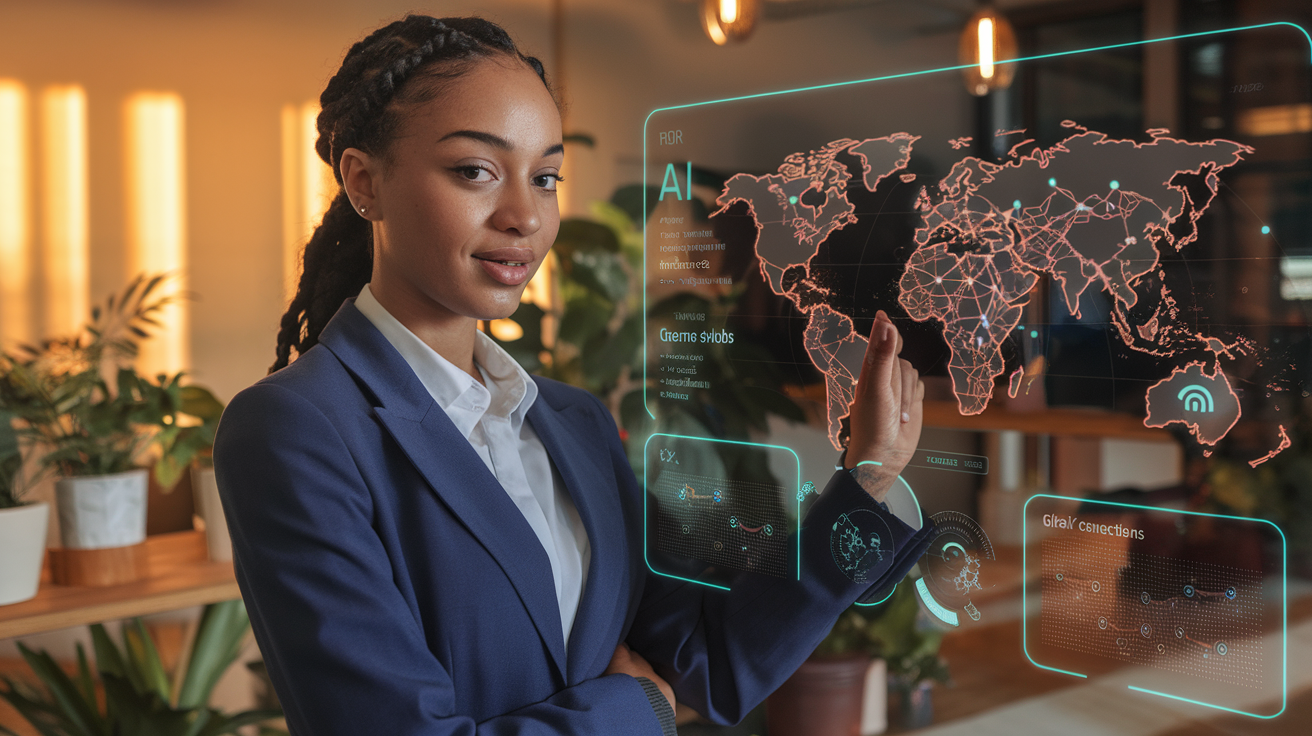
Strategic Opportunities for Africa in the Global AI Revolution
A. Leapfrogging Traditional Development Stages Through AI
Africa has a golden opportunity right now. While other regions spent decades building old tech infrastructure, Africa can jump straight to AI-powered systems. This isn’t just a nice theory – it’s already happening.
Take Rwanda’s drone delivery network for medical supplies. They skipped building thousands of miles of roads and went straight to drones. Same story with mobile banking – many African countries bypassed traditional banking systems and went straight to digital payments through phones.
AI can help African nations skip past outdated educational models too. Instead of building thousands of physical schools, AI-powered learning platforms can reach students in remote areas, delivering personalized education at a fraction of the cost.
The key advantage? Africa isn’t weighed down by legacy systems that need replacing. The continent can adopt cutting-edge AI solutions from day one.
B. Building Africa-Centric AI Solutions to Address Local Challenges
AI solutions made for New York or Tokyo often miss the mark in Lagos or Nairobi. Africa’s challenges are unique – and they need unique solutions.
Take agriculture. Most global AI farming tools are designed for large industrial farms. But Africa’s farming landscape is dominated by smallholders working just a few acres. Local AI startups are now developing solutions specifically for these farmers – apps that can work offline, require minimal data, and address issues like identifying cassava plant diseases or predicting localized weather patterns.
Healthcare shows similar promise. AI diagnostic tools trained on African patient data can better identify conditions like sickle cell anemia or skin diseases that present differently on darker skin tones.
Language is another frontier. Africa has over 2,000 languages, many at risk of extinction. AI language models trained specifically on African languages could preserve this cultural heritage while making technology more accessible to millions.
C. Leveraging Africa’s Unique Data Assets and Demographic Dividend
Africa’s greatest AI advantage might be its data. The continent has unique datasets that simply don’t exist elsewhere – from distinctive health records to diverse linguistic information to novel agricultural conditions.
These datasets aren’t just academically interesting – they’re commercially valuable. Companies worldwide are hungry for diverse data to train better AI models. African nations that properly manage and monetize this data could create entirely new revenue streams.
Then there’s Africa’s youth. The continent has the world’s youngest population, with 60% under age 25. While aging populations in Europe and Asia worry about AI replacing workers, Africa can train its massive youth population specifically for the AI economy.
This demographic dividend isn’t just about having young workers – it’s about having digital natives who can adapt quickly to emerging technologies. Young Africans are already showing remarkable innovation in mobile app development and could similarly excel in AI development.
D. Creating Pan-African AI Policies and Standards
Africa can’t afford 54 different AI strategies. The continent needs unified approaches to succeed in the global AI race.
The African Continental Free Trade Area (AfCFTA) already provides a framework for economic integration. Now, African nations must extend this to technology policy – creating shared standards for AI ethics, data privacy, and cross-border data flows.
Smart regulations could give Africa a competitive edge. While the EU focuses on restrictive data protection and the US takes a hands-off approach, Africa could chart a middle path – ensuring ethical AI use while encouraging innovation.
A Pan-African AI Research Network connecting universities across the continent could pool limited research resources. Similarly, a continent-wide AI talent pipeline program could help retain skilled developers who might otherwise leave for Silicon Valley or European tech hubs.
The challenge isn’t technical – it’s political. African leaders must recognize that collaboration on AI policy isn’t just nice-to-have; it’s essential for ensuring Africa shapes the future rather than having it imposed from outside.
Actionable Steps for African Stakeholders
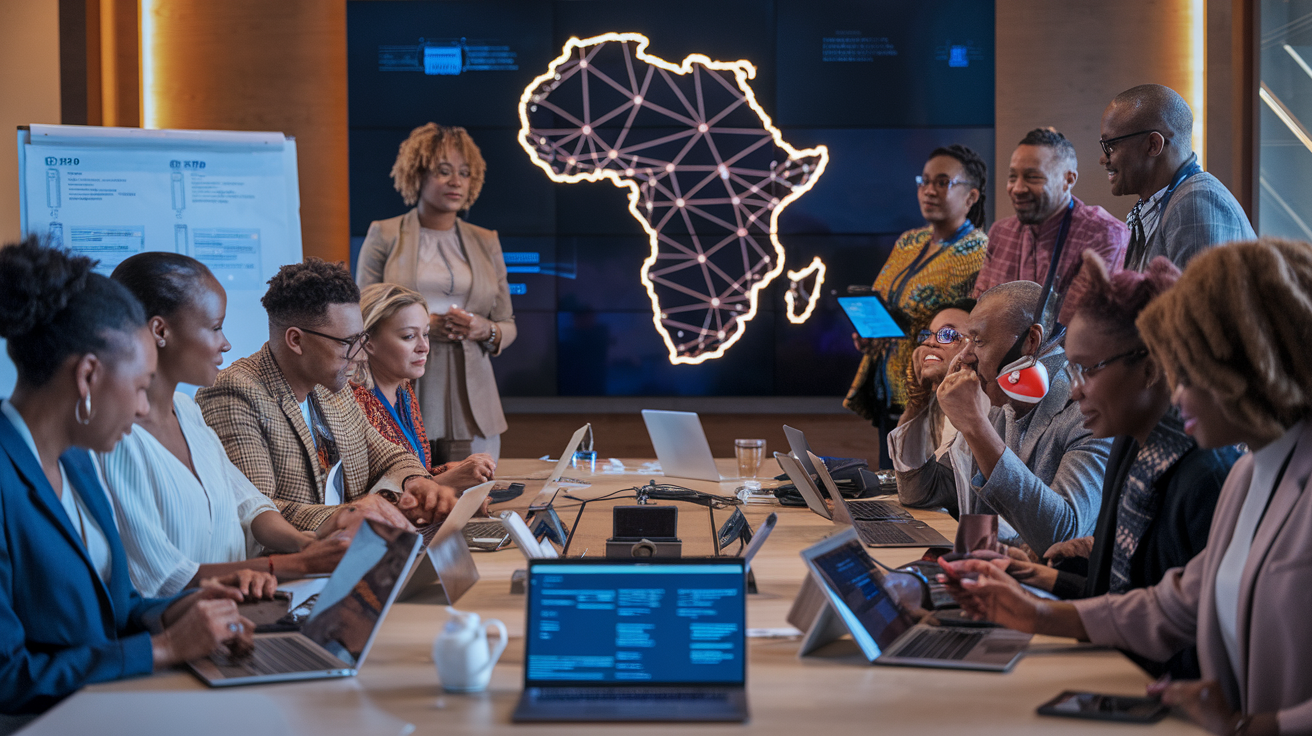
A. Essential Government Policies to Foster AI Development
Africa’s governments can’t afford to sit on the sidelines of the AI revolution while China and Western nations sprint ahead. Smart policy moves now will determine whether African nations become AI creators or merely consumers.
First things first: regulatory frameworks that actually make sense. We need policies that protect data sovereignty while encouraging innovation – not bureaucratic nightmares that strangle startups before they can breathe. Countries like Rwanda and Kenya have already shown this balance is possible.
Investment matters too. Governments should establish dedicated AI development funds – even modest ones signal to private investors that a country is serious about tech advancement. Tax incentives for AI startups and R&D can transform the landscape almost overnight.
Infrastructure can’t be ignored either. What good is AI talent without reliable electricity and internet? Prioritizing digital infrastructure development, especially in rural areas, creates the foundation everything else builds upon.
B. Educational Reforms to Build Local AI Talent
The talent gap is real, folks. Africa produces brilliant minds, but too few specialized in AI and machine learning. This needs urgent fixing.
Updating curriculum at all levels is step one. Primary schools need basic coding and computational thinking woven into everyday subjects. Secondary schools should offer specialized computer science tracks that actually reflect current tech, not textbooks from 2005.
Universities must forge partnerships with global tech leaders. When Ghana’s universities collaborated with Google on AI research, they didn’t just gain resources – they gave students real-world experience solving African problems with AI.
Bootcamps and certificate programs offer faster paths to skills development. These practical, intensive training models can quickly produce specialists ready for the workforce while universities catch up with curriculum reforms.
C. Public-Private Partnerships to Accelerate AI Adoption
The public sector has reach. The private sector has agility. Together, they’re unstoppable.
Industry-academic collaborations create real-world testing grounds for AI solutions. When Nigeria’s health ministry partnered with local AI startups to optimize vaccine distribution, both sides won – the government solved a critical problem while startups gained invaluable implementation experience.
Innovation hubs and accelerators thrive when jointly funded. The iHub in Kenya shows how government backing combined with private investment creates ecosystems where AI ventures can flourish.
Data-sharing frameworks between sectors unlock possibilities impossible otherwise. Government data sets, when properly anonymized and made accessible to trusted private partners, become goldmines for developing locally relevant AI applications.
D. Regional Collaboration Frameworks for AI Research and Innovation
No African nation can go it alone. Regional collaboration multiplies impact exponentially.
Shared research centers optimize limited resources. The AI Research Center in Kigali demonstrates how pooling talent and funding across East African nations creates research capabilities no single country could achieve independently.
Cross-border data agreements are crucial. Standardized protocols for sharing data between African nations creates datasets large enough to train competitive AI models without relying on external sources.
Talent mobility programs prevent brain drain by keeping experts within Africa. When researchers and developers can move freely between African tech hubs while working on continental priorities, everyone benefits.
E. Engaging with Global AI Governance to Ensure African Representation
Africa can’t just accept global AI rules written by others. Active participation in international governance is non-negotiable.
Building unified African positions on key AI issues gives the continent stronger negotiating power. When African representatives speak with one voice at forums like the Global Partnership on AI, they’re harder to ignore.
Developing Africa-specific ethical frameworks ensures AI development reflects African values and needs. Western ethical frameworks don’t always translate perfectly to African contexts – we need our own guidelines that consider unique cultural, economic and social factors.
Strategic partnerships with global tech companies must be negotiated from positions of strength. Rather than accepting whatever terms are offered, African nations should demand knowledge transfer, local hiring commitments, and data sovereignty protections.
Africa’s AI Awakening: From Spectator to Participant
The global AI race between the US and China represents a pivotal moment for Africa’s technological future. As China accelerates its AI capabilities with significant investments and strategic frameworks, African nations must recognize the profound implications this holds for their economic sovereignty and development trajectory. The continent’s current position—primarily as a consumer rather than creator of AI technologies—leaves it vulnerable to digital colonization and data exploitation, while simultaneously missing opportunities to develop contextually relevant AI solutions for uniquely African challenges.
Africa stands at a crossroads with clear paths forward. By establishing robust data governance frameworks, investing in specialized AI education, fostering regional collaboration, and developing ethical AI policies, African stakeholders can transform from passive technology recipients to active participants in the global AI ecosystem. The time for Africa to claim its place in the AI revolution is now—not as a battleground for competing superpowers, but as an independent voice shaping how these transformative technologies serve humanity’s diverse needs and contexts. The question is not whether Africa will be affected by the global AI race, but whether it will determine its own AI destiny.
